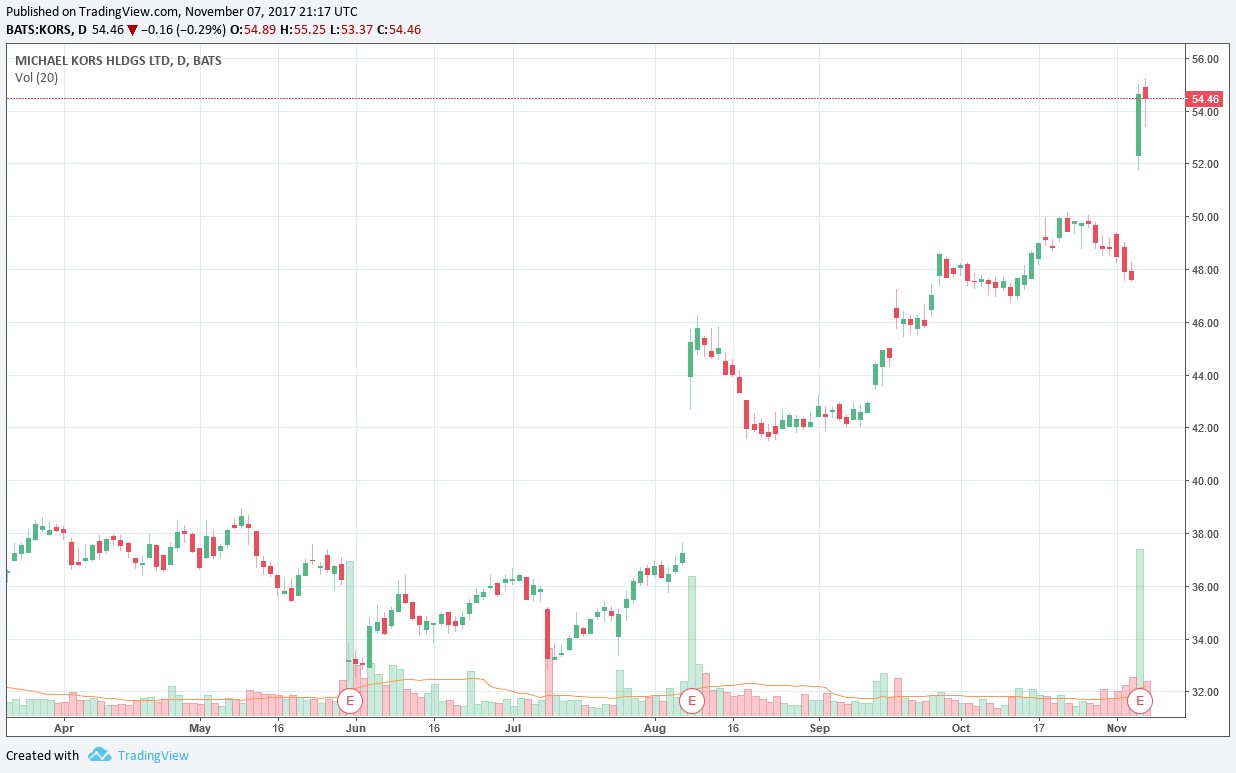Member LoginDividend CushionValue Trap |
Michael Kors’ Stock Surges; Market Overreacts to Hanesbrands' Results
publication date: Nov 7, 2017
|
author/source: Brian Nelson, CFA
Image shown: Shares of Michael Kors have been rocketing higher recently. The stock is rated 9 on the Valuentum Buying Index. The sole 9 rating on the Valuentum Buying Index has had a very nice couple of months recently. Meanwhile, Hanesbrands is feeling the wrath of considerable selling pressure, and we don’t think it is justified. By Brian Nelson, CFA What is value? It is not a low price-to-earnings ratio. It is not a low EV/EBITDA ratio. It is not a high book-to-market ratio or a low price-to-book ratio. Stocks with low price-to-earnings, EV/EBITDA, or price-to-book ratios could be undervalued or not. It depends on a variety of considerations. For one, what is the capital intensity of the company’s business model? A firm that doesn’t have to plow a lot of capital or free cash flow back into its business to sustain operations (and that can return more to shareholders) should have a higher multiple than one that must plow almost everything back into the business to keep operations going, all else equal. Surely this one makes sense: companies that have a significant amount of net cash on the books should trade at much higher multiples than companies that have a significant amount of net debt on the books, all else equal. The only way to know whether a stock is undervalued is to calculate its fair value and compare that to its share price. That is how you know what is a value stock or what may constitute a grouping of value stocks. It kind of makes you wonder what in the world commentators are talking about when they make broad generalizations about value stocks or growth stocks, especially when you know they aren’t doing many calculations at all. Truly, the financial industry needs a lot of help, and one can only feel for those that are trying to understand what in the world they are talking about when they, themselves, may not know. Remember: price versus value. If researchers aren’t using price-to-fair value ratios in their analysis, then they aren’t measuring value. They aren’t measuring much of anything, in fact, and they shouldn’t be generalizing about it. The many drivers that are implicitly embedded in traditional multiples are just too many. Only the price-to-fair value ratio measures value. It is what it is. We put together a recent piece on the predictive nature of fair value estimates, and we encourage readers to take a deep dive into the piece here. The enterprise discounted cash flow model, which forms the foundation for our fair value estimates, is the first pillar in the Valuentum Buying Index, or our timeliness rating methodology. Always compare a company’s price to its fair value estimate first, after considering an appropriate margin of safety, and then look to its Valuentum Buying Index rating for timeliness considerations. We put together a very lengthy study on the Valuentum Buying Index rating system here, but read this after the one on fair value estimates. The highest-rated company on the Valuentum Buying Index has been Michael Kors (KORS), and shares of the aspirational goods maker have been soaring of late. A combination of undervaluation and strong price momentum can often signal the mark of a good share-price run as the likelihood of price-to-fair value convergence is elevated given buying strength. We’re classifying the share-price activity in Hanesbrands (HBI) as very unusual. On October 18, the company announced preliminary third-quarter results, with shares trading and holding in the mid-$23 range at the time. There was nothing surprising in the pre-announcement, and the company said that it met its goal of “returning to organic growth” and that it “continued to generate strong operating cash flow.” Interestingly, Deutsche Bank initiated the company with a $29 price target and a “Buy” rating on October 24, shortly after the pre-announcement. When the company reported its third-quarter results November 1, they came in as expected, and management said that it “now expects net cash from operations to meet or exceed the midpoint of its original guidance:” $625-$725 million. Capital spending at the company is minimal, by comparison--expected to be $90 million in 2017. As with most in retail, the US market is challenging, but Hanesbrands noted that it expects to achieve “organic sales growth” in the fourth quarter and “drive strong double-digit online sales growth.” We’re a bit puzzled by the market’s reaction, but we admit that share prices have information in them, too. Could somebody know something? By the unusual pricing action, it sure would seem so. In any case, Hanesbrands’ adjusted earnings per share from continuing operations is expected to come in at $1.93-$1.95 for fiscal 2017, implying shares are trading at about 10 times current-year earnings. The company has a decent-sized net debt position, but its equity looks to be a rare bargain, especially in today’s frothy stock market. We’re keeping a close eye on Hanesbrands, but we’re not doing much more than that. The stock is not acting “right,” and the technicals have "information," too. Our fair value estimate, nonetheless, remains at $27 at the time of this writing. |


